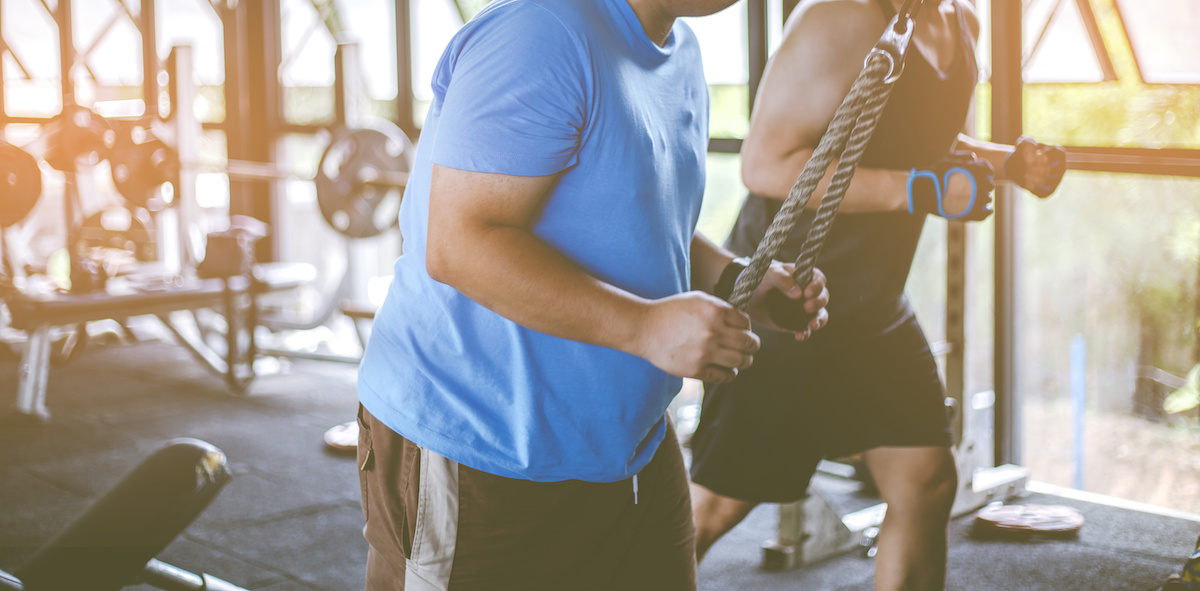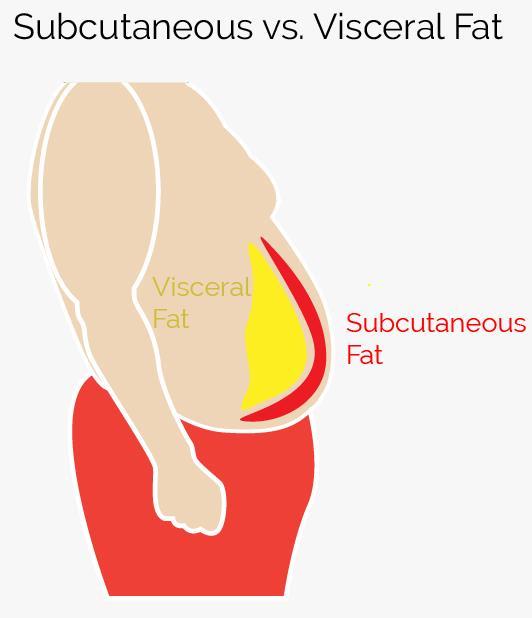
How to Use Water to Reduce Stress and Soothe Your Mind
Research has shown that exercising in the water can reduce stress on our joints. But water can also relieve stress from another very important part
April 1, 2020

With the increase in popularity of HIIT style workouts, there’s a growing concern that people may be pushing their bodies to the limit too often and overtraining. Overtraining syndrome can definitely be a factor in hurting your fitness progress, BUT it probably doesn’t apply to most people. Unless you’re exercising like a professional athlete, you probably don’t have to worry about overtraining.
What you should be most concerned with is poor exercise recovery, and one of the biggest factors that can impact your exercise recovery is too much stress, something that 77% of American adults report impacting their physical well-being.
Now, we know what you’re thinking: “Really? All the worry I’m putting myself through trying to lose fat is going to negatively impact my fitness progress?” Yes! In fact, forget your fitness goals–stress can make it difficult to even enjoy the benefits of exercise at all!
That’s because stress is more than just a feeling, it actually served an important evolutionary function for our prehistoric ancestors. As humans, it’s perfectly normal to experience mild stress and it actually has positive short-term benefits because it releases a hormone called cortisol. This stress hormone can give us “a quick burst of energy, heightened memory, increased heart rate, and a lowered sensitivity to pain”, which can be incredibly advantageous in high stakes situations.
However, as humans evolved the challenges we face today has shifted from acute stress (like an animal attack) to constant stress. The issue plaguing many people is high levels of chronic stress which leads to an overproduction of cortisol and results in health problems. Common effects of too much stress include memory loss, weakened immune function, fat gain, muscle loss, anxiety, just to name a few of many symptoms. That is why its crucial that we learn techniques to reduce this strain in our lives. Read on as we demystify stress, explain how chronic stress can affect your ability to achieve your ideal body composition, and show you tips for stress management.
In a culture where chronic stress seems to have been normalized because it’s something that nearly everyone experiences , it’s crucial that we learn how it can affect our health. Although we are still at the beginning of our understanding of how the human brain works, our thoughts, and state of mind can end up affecting our physical health.
To truly understand how cortisol can affect your body composition, we first need to look at how high levels of the stress hormone affect different components of the body. To keep things simple, we’ll be using the 2 Component (2C) model, which consists of Lean Body Mass and Fat Mass.

First, let’s examine how the stress hormone affects your Lean Body Mass (more specifically, your muscles and muscular development). As far back as 1964, researchers have suggested this hormone hampers protein synthesis. Protein synthesis = development of new muscle.
Researchers mimicked a stressed state in healthy test subjects by adding cortisol to their systems via IV and oral tablets. They found that cortisol and inactivity were linked with loss of Lean Body Mass, muscle loss, and negatively affected body composition overall. While inactivity can have this effect alone, the catabolic effect of cortisol seemed to play a significant role in muscle loss.
While we may not understand everything about the stress hormone yet, researchers are beginning to understand the effect that chronic stress can have on muscle recovery.
A study published in the Journal of Strength & Conditioning Research in 2014 was conducted to determine the relationship between stress and muscular recovery. Over the course of a 4-day period, the subjects’ perceived energy, fatigue, and soreness levels were measured after a bout of strenuous resistance exercise.

Over time, perceived stress can end up wearing away at both your mental and physical health. What’s worse, it doesn’t take weeks or months to start seeing the effects. It only took 4 days for researchers to notice a statistically significant impact on perceived energy, fatigue and soreness levels.
And it’s not just in our heads either. The results from the study also showed that over time, stress (whether it originates from an external event or perception) negatively influenced the recovery of muscular function after exercise.

Of course, that’s what we found just from looking at Lean Body Mass. Next, let’s look at how cortisol affects Fat Mass.
Some limited insights into the impact of cortisol on body fat can be gleaned from animal studies. One such study, a 2009 study conducted by the Wake Forest University School of Medicine, studied the effects of stress deriving from social settings and the accumulation of central body fat on a group of female primates.
Just as in human groups, the animals organized themselves into a dominant and subordinate hierarchy system. As you might imagine, the less powerful subordinates experienced more harassment, more stress, and – you guessed it – greater proportions of body fat, suggesting a link between greater stress and increased visceral fat – the type of that can have extremely damaging effects on your body. High visceral fat has been linked with heart disease, high blood pressure, and anxiety.

But that’s just one study and an animal study at that. Let’s look at a study with human subjects.
In 2000, University of California’s Health Psychology Program conducted a study designed to assess whether women with central fat distribution displayed consistently heightened cortisol reactivity when presented with nerve-racking situations.
What the study concluded was that stress-induced cortisol secretion could contribute to an increase in Fat Mass. Interestingly, when comparing subjects with greater fat content vs. leaner subjects, they found that the leaner subjects were more at risk than the subjects with greater body fat percentages.
The implication of this study suggests a fat gain positive feedback loop could occur if left unchecked: more stress -> more cortisol ->more body fat -> more stress
This is where the danger starts to become apparent. It’s not that it hinders one specific aspect of your overall fitness development– it impacts every aspect of it. Building muscle and losing fat becomes harder while under stress while gaining fat becomes easier than ever before. It’s clear that feeling stressed out can have a serious effect on your body and fitness level.
And that’s not the worst of it. Sure, there’s plenty of data that shows how stress makes it harder to reduce body fat and limit the benefits of exercise. But there’s just as much concern in the fitness community that elevated levels can derail one of the most important factors to achieving a healthier body: your diet and sleep.
Keep in mind that achieving a healthy body composition is more than just building muscle and losing fat. Maintaining a proper diet and getting enough sleep every night are necessities if you expect to make meaningful progress but that it can be difficult if you suffer from chronic stress.
A study conducted in 2016 by the Health Care Department or the Metropolitan Autonomous University was designed to observe whether there is a relationship between obesity, depression and emotional eating. Depressive symptoms have often been associated with obesity, and the study ventured to see how anxiety and depression can trigger emotional eating and subsequent weight gain.

Emotional eating occurs when people eat to deal with stressors – often overeating high-calorie sweet or fatty food. After examining the results of over 1,000 subjects and their emotional eating habits, the data suggested that depression-related emotional overeating can have a statistically significant impact on obesity and that emotion management may prove effective in obesity prevention.
Stress is hard enough to handle in small doses, but chronic stress can have complex, detrimental effects on your emotional health (which in turn, ends up impacting your overall health). While the benefits of maintaining good nutrition and managing your calories are well established, it is becoming clear that how you address the triggers of stress is just as important when you are constructing your diet plan.
But stress can impact not only your diet but your sleep. The average adult barely gets enough sleep as it is, with about a third of adults reporting less than 6 hours of sleep every night. Chronic stress can make it harder to fall asleep, resulting in an endless cycle.
Consider the findings of a study conducted in 1997 by the University of Chicago’s Department of Medicine. The expressed purpose of the study was to determine the relationship between sleep loss and cortisol levels.
Long story short, the study concluded that when your body doesn’t get enough sleep, your cortisol levels can rise anywhere from 37-45%, which according to researchers can “accelerate the development of metabolic and cognitive consequences of glucocorticoid excess.”
Translation? The increased cortisol levels can seriously threaten your muscle development (never mind the reduced GH and testosterone levels caused by your lack of sleep) and make it that much harder to reach your fitness goals. Even partial sleep loss is enough to raise your cortisol levels and bring on the entire host of problems that come along with it.

When you embark on your fitness journey to improve your health, there are so many different factors that come into play you might start to feel overwhelmed, especially when it seems like you aren’t making any progress.
Ironically, worrying that you aren’t making any progress may reduce/limit any positive benefits that you get from exercise.
Fortunately, there are plenty of tools you can utilize. Making sure you get enough sleep is crucial to managing for both your stress levels and mental health. Research has shown that mindfulness practices like meditation and yoga can help lower stress, along with other positive benefits.
The key to stress management is to make sure you something positive that you can turn too in your time of need. Because if you don’t have a plan, stress can cause health problems and end up as one of the biggest barriers between you and your fitness goals.
The fact that chronically elevated stress levels have a negative effect on the humans is hardly a revelation these days – symptoms ranging from a depressed emotional state to compromised immune system has been well-established. The more we study stress and try to understand how it specifically affects the human body, the more we realize that it might be one of the underlying issues holding us back in the pursuit of a healthier, happier life.
Don’t let stress hold you back!
***
Brian Leguizamon is a content marketing specialist. Brian has worked with Shopify, Gigster and a bunch of startups you’ve never heard of. When he’s not working, you’ll find him at his local gym, waiting for the squat rack to open up

Research has shown that exercising in the water can reduce stress on our joints. But water can also relieve stress from another very important part

Ever been so stressed that you told yourself, I need to start meditating. Well, now’s the time! (And just in time for National Stress Awareness Month

Raise your hand if you’re feeling: TiredStressedUnsure of yourselfPowerlessAnxious Now, shift your attention to your breath (you can lower your hand now). Without altering your
Article contributed by Geraldine Chapman
Geraldine Chapman is the Director of Information Marketing & Social Media at American Family Fitness in Richmond, VA. She’s been in the fitness industry professionally since 1997 as a personal trainer, group fitness manager, and fitness instructor. She has trained and certified in multiple fitness programs over the years. Her favorites to teach are barre, Active®, Blast®, and Power®. Geraldine graduated from Virginia Commonwealth University with a B.A. in Communication Arts & Design. She is also a Certified High-Performance Coach and Applied Neuro Strategist. She is passionate about researching autoimmune diseases and how lifestyle, fitness, nutrition, and mindset play a vital role in the prevention and management of autoimmune issues. When not working, you can find Geraldine with a camera in hand, enjoying quality time with her family and riding her motorcycle around town.
Stay connected with us through our monthly newsletter to get the latest news, updates, fitness tips and more.